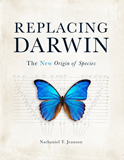
Dark Side of Darwin
Time: “The Dark Side of Darwin’s Legacy” Are creationists the only ones pointing out the “dark side” (the perturbing implications) of Darwin’s view on life’s origins?
Time magazine’s Eben Harrell spoke with journalist Dennis Sewell, the author of The Political Gene: How Darwin’s Ideas Changed Politics who claims that “evolution is scientifically undeniable, but its contribution to human well-being is unclear.” That view is distinct enough from the evolutionary mainstream that we thought it worth a closer look.
Sewell seems unsure of where our morality should come from.
Among Sewell’s interesting claims:
- “Darwin was wrong about certain key issues. He asserted that different races of mankind had traveled different distances along the evolutionary path—white Caucasians were at the top of the racial hierarchy, while black and brown people ranked below. . . . [H]e presented racial hierarchy as a matter of science. He also held that the poor were genetically second-rate—which inspired eugenics.”
- “[School shooter] Pekka-Eric Auvinen . . . thought through the philosophical implications of Darwin’s work and came to the conclusion that human life is like every other type of animal life: it has no extraordinary value. The Columbine killers made similar arguments. . . . These are examples of how easily Darwin’s writings can lead to very disturbed ways of thinking.”
- “What has the theory of evolution done for the practical benefit of humanity? It’s helped our understanding of ourselves, yet compared to, say, the discovery of penicillin or the invention of the World Wide Web, I wonder why Darwin occupies this position at the pinnacle of esteem. I can only imagine he has been put there by a vast public relations exercise.”
Sewell’s comments are surprisingly frank considering the usual praise evolutionists heap on Darwin. Indeed, his comments mirror much of what we have written about the consequences of a Darwinian mentality on life.
Sadly, Sewell, while comprehending the moral erosion made possible by Darwin’s ideas, seems unsure of where our morality should come from. “I think we have to decide what status we are going to give to the human race,” Sewell offers. “Most of the world’s religions hold that human life is sacred and special in some way. In teaching our common descent with animals, we also have to examine what is special about human beings, and why they deserve to be treated differently and granted certain rights.”
This week saw increased media coverage of Darwin because it was the 150th anniversary of the publication of On the Origin of Species. To mark the event, New Scientist obtained an “interview” with Darwin. While clearly intended as humor, the interview does deal with numerous topics we’ve addressed before (many times, in the case of most).
For more information:
- Darwin’s Sad Legacy
- Get Answers: Charles Darwin, Morality & Ethics
Remember, if you see a news story that might merit some attention, let us know about it! (Note: if the story originates from the Associated Press, Fox News, MSNBC, the New York Times, or another major national media outlet, we will most likely have already heard about it.) And thanks to all of our readers who have submitted great news tips to us.
(Please note that links will take you directly to the source. Answers in Genesis is not responsible for content on the websites to which we refer. For more information, please see our Privacy Policy.)
Recommended Resources

Answers in Genesis is an apologetics ministry, dedicated to helping Christians defend their faith and proclaim the good news of Jesus Christ.
- Customer Service 800.778.3390
- Available Monday–Friday | 9 AM–5 PM ET
- © 2026 Answers in Genesis

